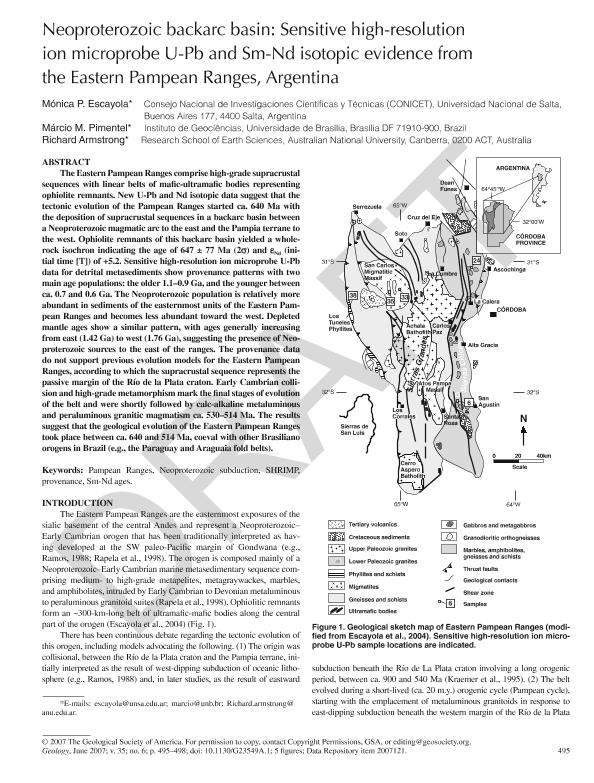Mostrar el registro sencillo del ítem
dc.contributor.author
Escayola, Monica Patricia

dc.contributor.author
Pimentel, Márcio M.
dc.contributor.author
Armstrong, Richard
dc.date.available
2019-12-23T18:03:48Z
dc.date.issued
2007-06
dc.identifier.citation
Escayola, Monica Patricia; Pimentel, Márcio M.; Armstrong, Richard; Neoproterozoic backarc basin: Sensitive high-resolution ion microprobe U-Pb and Sm-Nd isotopic evidence from the Eastern Pampean Ranges, Argentina; Geological Society of America; Geology; 35; 6; 6-2007; 495-498
dc.identifier.issn
0091-7613
dc.identifier.uri
http://hdl.handle.net/11336/92819
dc.description.abstract
The Eastern Pampean Ranges comprise high-grade supracrustal sequences with linear belts of mafic-ultramafic bodies representing ophiolite remnants. New U-Pb and Nd isotopic data suggest that the tectonic evolution of the Pampean Ranges started ca. 640 Ma with the deposition of supracrustal sequences in a backarc basin between a Neoproterozoic magmatic arc to the east and the Pampia terrane to the west. Ophiolite remnants of this backarc basin yielded a whole-rock isochron indicating the age of 647 ± 77 Ma (2σ) and εNd (initial time [T]) of +5.2. Sensitive high-resolution ion microprobe U-Pb data for detrital metasediments show provenance patterns with two main age populations: the older 1.1-0.9 Ga, and the younger between ca. 0.7 and 0.6 Ga. The Neoproterozoic population is relatively more abundant in sediments of the easternmost units of the Eastern Pampean Ranges and becomes less abundant toward the west. Depleted mantle ages show a similar pattern, with ages generally increasing from east (1.42 Ga) to west (1.76 Ga), suggesting the presence of Neoproterozoic sources to the east of the ranges. The provenance data do not support previous evolution models for the Eastern Pampean Ranges, according to which the supracrustal sequence represents the passive margin of the Río de la Plata craton. Early Cambrian collision and high-grade metamorphism mark the final stages of evolution of the belt and were shortly followed by calc-alkaline metaluminous and peraluminous granitic magmatism ca. 530-514 Ma. The results suggest that the geological evolution of the Eastern Pampean Ranges took place between ca. 640 and 514 Ma, coeval with other Brasiliano orogens in Brazil (e.g., the Paraguay and Araguaia fold belts).
dc.format
application/pdf
dc.language.iso
eng
dc.publisher
Geological Society of America

dc.rights
info:eu-repo/semantics/openAccess
dc.rights.uri
https://creativecommons.org/licenses/by-nc-sa/2.5/ar/
dc.subject
NEOPROTEROZOIC SUBDUCTION
dc.subject
PAMPEAN RANGES
dc.subject
PROVENANCE
dc.subject
SHRIMP
dc.subject
SM-ND AGES
dc.subject.classification
Geología

dc.subject.classification
Ciencias de la Tierra y relacionadas con el Medio Ambiente

dc.subject.classification
CIENCIAS NATURALES Y EXACTAS

dc.title
Neoproterozoic backarc basin: Sensitive high-resolution ion microprobe U-Pb and Sm-Nd isotopic evidence from the Eastern Pampean Ranges, Argentina
dc.type
info:eu-repo/semantics/article
dc.type
info:ar-repo/semantics/artículo
dc.type
info:eu-repo/semantics/publishedVersion
dc.date.updated
2019-11-25T17:29:21Z
dc.journal.volume
35
dc.journal.number
6
dc.journal.pagination
495-498
dc.journal.pais
Estados Unidos

dc.journal.ciudad
Boulder
dc.description.fil
Fil: Escayola, Monica Patricia. Consejo Nacional de Investigaciones Científicas y Técnicas. Oficina de Coordinación Administrativa Ciudad Universitaria. Instituto de Estudios Andinos "Don Pablo Groeber". Universidad de Buenos Aires. Facultad de Ciencias Exactas y Naturales. Instituto de Estudios Andinos "Don Pablo Groeber"; Argentina
dc.description.fil
Fil: Pimentel, Márcio M.. Universidade do Brasília; Brasil
dc.description.fil
Fil: Armstrong, Richard. Australian National University; Australia
dc.journal.title
Geology

dc.relation.alternativeid
info:eu-repo/semantics/altIdentifier/url/https://pubs.geoscienceworld.org/gsa/geology/article-abstract/35/6/495/129864/Neoproterozoic-backarc-basin-Sensitive-high
dc.relation.alternativeid
info:eu-repo/semantics/altIdentifier/doi/http://dx.doi.org/10.1130/G23549A.1
Archivos asociados
